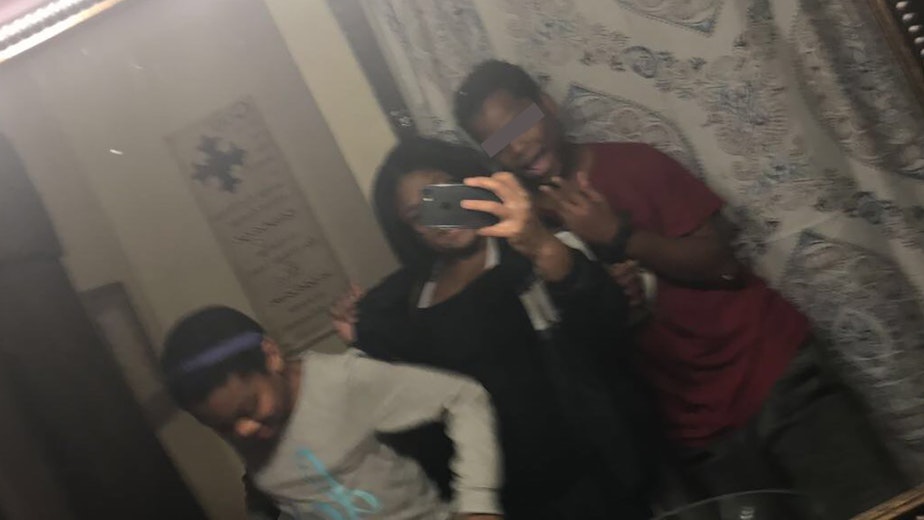'Don’t take my silence as weakness.' A teen shares her experience in the foster care system

There are currently more than 400,000 children and teens in foster care in the United States. RadioActive's Kemijah Slaughter was one of those children.
As a senior in high school, Kemijah is empowered to tell her story - on her own terms.
[RadioActive Youth Media is KUOW's radio journalism and audio storytelling program for young people. This episode was entirely youth-produced, from the writing to the audio editing.]
Living in the foster care system is about survival and going through things a child should not have to experience.
The struggles I went through meant I had to put a fake smile on when I was broken on the inside and very traumatized.
I had to go to court to advocate to see my siblings. I had to move all the time - change schools, and cities - without notice. I had to fight to not take medication while placed in a group home.
Sponsored
Those are things that most teens do not have to experience.
I always wanted to stay together with my younger brother and sister, but I was separated from them when I was 11.
Sometimes I lived in foster homes with strangers and their kids, and sometimes in group homes with a bunch of other kids my age.
Sponsored
When I was 13 I was placed in a behavioral residential treatment facility in Idaho. I was even further from my goal of being with my siblings.
I talked with my social worker Kelsey Gordon about the ways I was dealing with all of the chaos, and she asked me some questions about that time.
"So why did you decide to have those types of behaviors?" Kelsey asks me.
"I couldn't trust anyone," I answer. "And I was super closed-off."
I encountered racism and being treated differently in numerous foster homes.
Sponsored
The hardest part was being away from my siblings because they were the whole world to me. I started to be impulsive rather than think with my head.
During that time I got a lot of emotional support from my social workers. It was helpful to have someone who understood what I was going through.
Kelsey asks me, "Do you think it made a difference, having myself as your social worker who is a Black woman?"
"I think it did," I respond, "because I got the emotional and mental support of both of you. Even working with Sihnae, my old social worker, she would help a lot with getting me hair products or skin products that living in a white group home or foster home I wouldn't be able to get."
But even with their support, there were so many moments I thought I couldn't do this anymore. I worried I wasn't worthy enough to go to a foster home that would love me, seeing that both my brother and sister got adopted and I didn't.
Sponsored
It's especially hard getting adopted as a teenager in the system with behavioral issues.
After I left the facility in Idaho I moved around some more and finally ended up back with my mom. I've been here for almost two years and I'm doing pretty good.
I still talk with my brother sometimes but we don't have a strong connection anymore. I barely speak with my sister, and I really wish I did.
Sponsored
With how far I've come, I can see I'm a different person than I was before. I ask my social worker how she's seen me grow.
"I think that you've matured a lot," Kelsey answers. "I think with you being in the system for so long, you became kind of dependent on always having a social worker or somebody to call when things went bad. Now I feel that you're learning how to communicate with people better."
Kelsey goes on to tell me, "you're such a sweetheart. So smart, and so ambitious. I think it's really just you going from being a girl to becoming a woman."
I am a senior in high school now and I want to attend Howard University and become a midwife.
I asked Kelsey what she wants for me.
"I wanna see you be able to live independently outside of your mom's home and be able to take care of yourself and keep yourself motivated," Kelsey says. "Because when you go off to college, you're gonna have to do all that work yourself."
"I just want to see you grow into the young woman that I know you're trying to become, and hopefully you have the motivation to do that."
Hearing my social worker have such big hopes and dreams for me makes me encouraged to do better, not just for her, but for myself and for all the kids in the foster care system.
Don't take my silence as a weakness.
I've become stronger and wiser from everything that I went through to make me the person I am today.
This story was created in KUOW's RadioActive Online Intro to Radio Journalism Workshop for 15- to 18-year-olds, with production support by Ardo Hersi and Iz Ortiz. Prepared for the web by Iz Ortiz. Edited by Lila Lakehart. Consultation support by Brittany Bartkowiak.
Find RadioActive on Facebook, Twitter, Instagram, TikTok, and on the RadioActive podcast.
Support for KUOW's RadioActive comes from the Bill & Melinda Gates Foundation Discovery Center.
If you have any feedback on this story, you can email RadioActive at radioactive@kuow.org, or fill out the box below. Reach out. We're listening.



